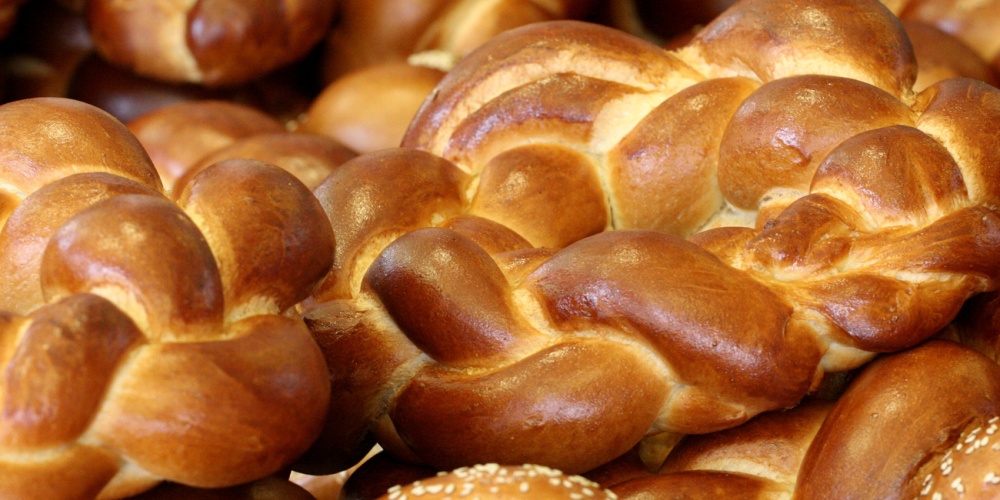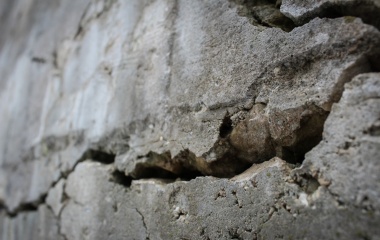
“And you shall place on the table showbread before Me tamid, at all times” (Shemot 25:30). The lechem hapanim consisted of 12 loaves of bread, baked fresh erev Shabbat and eaten fresh the following Shabbat, split between the outgoing and incoming kohanim who were on duty that week.
The Mishna (Menachot 99b) quotes a rather obscure argument regarding the exact method for placing the bread on the table. Understanding tamid in a most literal sense, the tanna kamma, the anonymous first view cited, asserts that at each and every moment the lechem hapanim had to remain on the shulchan. One could not lift up the bread and seconds later replace it with the new bread. Rather, “The ones bringing in the bread would stand in the north side and face south and those taking out the bread would stand in the south and face north. These would take out and those would place down, a fistful removing [the bread] against a fistful placing [down the new bread], as it says, ‘before Me always’” (Menachot 99b). As last week’s bread was removed inch by inch (or handful by handful), the new bread would simultaneously be placed on the table.
Rav Yossi disagrees, arguing, “Even if these [are first] removed and these [are later] put down, it is called tamid”. The Gemara, quoting a Braitta, clarifies Rav Yossi’s position: “Even if he removed the old in the morning and put down the new in the evening, there is nothing wrong with such. What then is the meaning of “before me always’? That the table should not sleep, i.e., go overnight without bread”.
This discussion takes place well after the destruction of the Temple and hence, it is seemingly of no practical relevance[1]. But such an assumption would be grossly mistaken. The rabbis of the Talmud worked on the premise that whatever happened in the House of G-d had a parallel in man’s house.
“Rabbi Ami says: From Rabbi Yossi’s statement we may learn that even if a person learns only one chapter in the morning and one chapter in the evening, he thereby fulfils the mitzvah of ‘This Torah scroll shall not depart from your mouth, and you shall contemplate in it day and night’” (Yehoshua 1:8). Doing something “day and night” does not mean it must be done 24/7, but rather that it must be done consistently, each and every day. Learning a little Torah each and every morning and each and every evening fulfils the mitzvah of learning Torah day and night.
Rav Yochanan, quoting Rav Shimon bar Yochai, takes this even further, arguing that, “Even if a person recites the shema in the morning and in the evening, he has fulfilled the mitzvah of ‘This Torah scroll shall not depart from your mouth’”. The simple act of saying the shema twice a day, thereby accepting the yoke of heaven, is a fulfilment of the mitzvah to learn Torah constantly.
Yet at the same time, he[2] adds “that it is forbidden to say this to an unlearned person[3]”. While the recital of the shema demonstrates one’s daily, even constant, commitment to Torah study, it surely reflects the minimum standard. One who fulfils their obligation to learn by reciting the shema and little else will remain an ignoramus, and will miss out on the beauty, wisdom, depth, and breadth of Torah study. They will be unaware of the grandeur of Jewish history, will remain unchallenged by the questions of Jewish philosophy and, of course, will remain unable to jump into the sea of Talmud. Surely this is not something we should be teaching to the unlettered. Rather, we need to encourage them to study more and we best not discuss the parameters of the mitzvah of Talmud Torah with those who may not even be aware of such a mitzvah[4].
Or, might we argue the exact opposite? Why not let the ignorant know that all it takes to be included amongst those who study Torah day and night is the recital of the shema? Let people know how easy it is to live a life dedicated to Torah, and perhaps, slowly but surely, people will be encouraged to do more. We generally accomplish much more by lauding success than by constantly raising the bar. And thus Rava says, “It is a mitzvah to say this in the presence of the ignorant”.
Of course, there is no right or wrong answer in this debate. Much depends on the person, time and place, and one must be prepared to use both approaches—even, at times, simultaneously. This is highlighted by the fact that Rava lived three generations after Rav Yochanan (and some five generations after Rav Shimon bar Yochai). In other words, it is likely that during earlier times in the land of Israel, where Rav Yochanan and Rav Shimon bar Yochai lived, it was considered wiser not to publicize this teaching, but some 100 years later in Bavel where Rava lived, publicizing such was the more effective approach[5].
But there are, apparently, other views. “Ben Dama, son of Rabbi Yishmael’s sister, asked Rabbi Yishmael: ‘For example I, who have learned the entire Torah, may I study Greek wisdom?’ Rabbi Yishmael recited this verse about him: ‘This Torah scroll shall not depart from your mouth, and you shall contemplate in it day and night’. Go and search for an hour that is neither part of the day nor part of the night, and learn Greek wisdom in it”.
While it appears that Rabbi Yishmael disagrees with Rav Shimon bar Yochai, arguing that the verse in Yehoshua obligates one to learn day and night, it is unlikely that he believes such is actually required. For starters, such an approach is clearly impossible in practice. One cannot possibly learn day and night. But beyond practicalities, it is Rabbi Yishmael who taught that “one should act in the way of the world”, plowing during plowing season, sowing during sowing season, harvesting during harvest season, threshing during the threshing season, winnowing during the winnowing season[6](Brachot 35b). How, then, do we explain his answer to his nephew?
Ben Dama, who appears not even once in the entire Mishna, and hence we have no reason to beleive he was a Torah scholar, claims that he knows the entire Torah. One who has such hubris clearly has learned very little and must spend day and night engaged in Torah, learning, for example, humility from Moshe.
Moreover, Ben Dama did not ask if he could study other generic disciplines. He asked specifically about Greek wisdom, an obscure and esoteric area of knowledge[7] previously forbidden by the Sages (Sotah 49a). Ben Doma appeared to be asking for an exemption from this decree, and Rabbi Yishmael was willing to give him one—provided it occurred during a time that was neither day nor night.
Whatever the technical obligation to study Torah may be, it is a great privilege to be able to spend time engrossed in its study, a theme we will, please G-d, pick up in our next post.
[1] The dislocation and confusion caused by the destruction of the Temple is seen in the many arguments about many of the Temple rituals, a problem compounded by the fact that often those running the Temple did not follow the rabbinic interpretations.
[2] It is not clear whether this is the continuation of Rav Shimon bar Yochai’s teaching or is Rav Yochanan’s (or the Gemara’s itself) comment on this teaching.
[3] This is a further indication that the Talmud was written by rabbis for rabbis, and that it never dawned upon our Talmudic Sages that the average person would ever study the “Talmud”. Please see the next footnote.
[4] While educational institutions often stress the notion of yeridat hadorot, that prior generations were more learned than ours, that is only half the story. While it may be true that the giants of yesteryear tower over those of today (while people have been saying that for years, that does not mean it is not true), there is little doubt that the average graduate of a day school is light years, and then some, more knowledgeable than the typical “am ha’aretz” of the Talmud. That Rabbi Akiva was an illiterate until the age of 40 was par for the course.
[5] It hardly needs mentioning that in today’s world, where access to all information is no more than a click away, the notion that a rabbi would hide information is a sure recipe for disaster. It is not by chance that freedom of the press is a cornerstone of a free society.
[6] In that same Gemara, Rabbi Shimon bar Yochai argues that if the Jews are “doing the will of the Almighty, their work will be done by others”, allowing them to learn all day. As is evident by his position here, Rabbi Shimon bar Yochai sees this as a blessing but not an obligation.
[7] The Gemara never defines what it means by Greek wisdom, and there is general agreement that it does not include any of the natural sciences or even philosophy. Rashi (Sotah 49b s.v. Chochmat Yevanit) and the Rambam (Commentary to the Mishna, Sotah, chapter 9) define it as some sort of coded speech. The Rambam asserts that whatever it may have been, it no longer exists.



